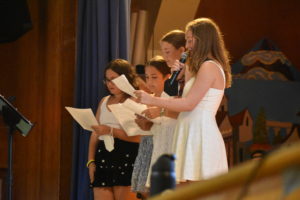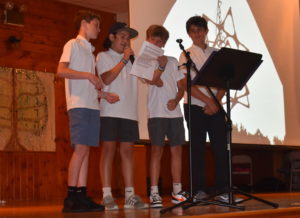The unit of Arava led our Friday night Shabbat services last week. Their theme was Rachamim or acting with your heart. Below are some of the words they shared.
 By Stella, Lila, and Liv: Shabbat Shalom! This week’s middah is Rachamim, acting with your heart. Most people think of Rachamim as cheering on your friends as they climb the tower or checking in on them when they are homesick. But there is much more to Rachamim than just that. Even if it is something as small as cheering for your friend on the tower, or something much more meaningful than that, just know that your actions coming from your heart could mean the world to someone, no matter what. Throughout tonight’s service you will hear lots of different ways that we, as Arava campers, can act with our hearts. Since this is only the first Shabbat of the session, don’t pass up the chance to act with your heart throughout the summer, no matter what the situation is. We challenge you to find ways to act with your heart this summer.
By Stella, Lila, and Liv: Shabbat Shalom! This week’s middah is Rachamim, acting with your heart. Most people think of Rachamim as cheering on your friends as they climb the tower or checking in on them when they are homesick. But there is much more to Rachamim than just that. Even if it is something as small as cheering for your friend on the tower, or something much more meaningful than that, just know that your actions coming from your heart could mean the world to someone, no matter what. Throughout tonight’s service you will hear lots of different ways that we, as Arava campers, can act with our hearts. Since this is only the first Shabbat of the session, don’t pass up the chance to act with your heart throughout the summer, no matter what the situation is. We challenge you to find ways to act with your heart this summer.
By Rachel and Lola: The Bar’chu brings us into prayer; it calls us together as a community. During other prayers, everyone may be focused on many different things. But during the Bar’chu, we all stand together. This makes Bar’chu the opportunity to see that we are all joined in the same words and the same prayer towards G-d as we start our service. While there is value in being able to do your own thing at some points, there are also times when it is important for everyone to feel included in the same words or the same activity. One time that I felt connected with my bunkmates was at rest hour, when we all swung each other in the hammock, and had nice talks that we were all included in. One example for me was when I was taught a new card game. I felt included and I enjoyed my time with my bunk. Inclusion is an important value at camp, and it is what helps everyone feel safe and happy. Let’s all work on including everyone. Please rise as we join together in Bar’chu.
By Maya, Liza, and Maddie: Here at camp, there are many ways to show Rahamim, acting with your heart. For example, when I came on Opening Day, all my double session friends were there to welcome me back home. Even though we had already been at camp for a month, we made sure that everyone felt at home. By doing this, we gave them the chance to have a great summer. When my friends acted with their hearts and helped me, I could tell they cared about me. By helping them, it made everyone feel ready to make long-lasting memories. When you show Rachamim, you don’t only impact one person, but everyone surrounding you. As we roll into each day, think about how you can use Rachamim to help yourself and the whole community.
By Emma and Adam: We met in Carmel. Ever since, we have been inseparable. The prayer we are about to say is called Ahavat Olam, and it is about a love that lasts forever. In the prayer, that love is the love between G-d and the People of Israel. This Shabbat, we will also focus on the “Ahavah” – the love – of our friendship, which is also something that feels like it will last forever. At the beginning of COVID, we lost touch – but after about a year, we were reunited in Kineret, and our bond of friendship was stronger than ever. In the prayer Ahavat Olam, there is the symbol of love between G-d and the Jewish people that, even though we may not always feel it, we know that it still exists. That is the way it can be with our friendships, particularly when we don’t see people for a long time. But the moment we are back together, that love comes through. When camp ended that year, we traded numbers and we laughed at each others’ knock-off Tik-Tok accounts. We are so grateful for the love in our friendship, which is strong both when we are here at camp together and even when we are back home and not seeing each other all the time. Ahavat Olam is a love that lasts forever. Shabbat Shalom!
 By Rebecca, Clara, and Sophia: We think that the Sh’ma has different meanings to everyone. For example, I think the Sh’ma is a call to prayer. The Sh’ma is telling G-d you are ready to pray. G-d will answer your prayers. If you want to be heard by G-d and you want G-d to respond or help you when you are in need, the Sh’ma will catch G-d’s attention. I think the Sh’ma is about feeling and being blessed. It is important because otherwise, we would not feel special. But, by listening and learning to accept G-d, then They will accept us. But this scenario can happen and thrive anywhere, especially at camp. When you listen to others and help others, they will return your act of kindness and they will feel blessed. I think this is the purpose of the Sh’ma. This short but sweet prayer reminds us of meditation and hope. I think Sh’ma is about listening. This is really important because when we listen, we make others feel better, and people are more likely to listen to us. G-d listens to us, and we open our hearts to listen to G-d. Although we each have different opinions and interpretations of this prayer, we learn, we feel blessed and we receive G-d’s listening and attention through singing these words together.
By Rebecca, Clara, and Sophia: We think that the Sh’ma has different meanings to everyone. For example, I think the Sh’ma is a call to prayer. The Sh’ma is telling G-d you are ready to pray. G-d will answer your prayers. If you want to be heard by G-d and you want G-d to respond or help you when you are in need, the Sh’ma will catch G-d’s attention. I think the Sh’ma is about feeling and being blessed. It is important because otherwise, we would not feel special. But, by listening and learning to accept G-d, then They will accept us. But this scenario can happen and thrive anywhere, especially at camp. When you listen to others and help others, they will return your act of kindness and they will feel blessed. I think this is the purpose of the Sh’ma. This short but sweet prayer reminds us of meditation and hope. I think Sh’ma is about listening. This is really important because when we listen, we make others feel better, and people are more likely to listen to us. G-d listens to us, and we open our hearts to listen to G-d. Although we each have different opinions and interpretations of this prayer, we learn, we feel blessed and we receive G-d’s listening and attention through singing these words together.
By Sadie, Talya, Sarina, and Sophie: All four of us have had unique experiences staying for two sessions this summer. Going from 14 campers in our bunk to 4 campers during intersession to 15 campers in less than a week has been a challenge. But we learned to act with our hearts along the way. This has included supporting each other and our new friends. Going double session my first year at camp has taught me to live with and even celebrate the changes that happened over the summer. When people acted with their hearts towards me, I felt very welcome and safe in the Harlam community. Being a second session camper going double for the first time was scary. When people showed Rachamim towards me, it made me feel like I belonged both sessions. Plus, I made new lifelong friends over the summer. In the Mi Chamocha, the Jewish people run from Pharaoh and celebrate God using Rachamim to assist their freedom. This is similar to how we act with our hearts to help each other feel at home and celebrate the changes that have occurred this summer, even if they can be scary. Please challenge yourself to act with your heart anywhere you go and join us in the Mi Chamocha.
By Sammy and Asher: This year, right before camp I got COVID. I am normally a first session camper but now I am here, under the shelter of Camp Harlam. The Hashkiveinu teaches us about peace and shelter. I remember the first Shabbat when they put a Tallitot over me, and I felt safe under Harlam’s shelter. This is my first year going double session so I was really scared about meeting the second session kids, but they have been so kind that I feel like I have been going second session since Carmel. Now that I have been here for three days with new people, I feel at home and ready to have lots of fun. In the English translation of the Hashkiveinu, it asks God to guide us with wisdom, compassion, and trust. Now as your counselors spread the Tallitot over your head, look up for a second and see names from years past and this year.
By Zinnia and Sarah: Last year when we were in Kineret, I was very homesick. Being homesick made me not want to do any activities. I helped to comfort her and she felt better. So we had so much fun the rest of the summer. For us, Rachamim means helping someone when they are upset. It also means so much more, like including everyone, encouraging others, and coming to compromises. All these things are examples of acting with your heart. But they also bring peace to camp, which is needed for a good summer. We can’t wait to spend the rest of the summer together, acting with our hearts and bringing peace to camp. When you listen to Shalom Rav, think of all the ways you can bring peace to camp.
By Spencer and Henry: The Mourner’s Kaddish, a prayer about cherishing the life of our lost loved ones, relatives, friends, pets, or more. Rachamim is acting with your heart. Some ways of doing this are comforting your friend or even family member when they have had a loss or talking to them to make them feel better. By doing this, we help the deceased’s spirits carry on.
By Josh, Zack, Elijah, and Noam: Inclusion means including all people. It means being kind and being nice. It feels like you are a part of something. Camp brings people together. Our prayer is that camp is an inclusive place. To make our prayer come true we all need to be kind. That way, we can all feel at home here. That is what inclusion is all about.
